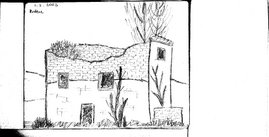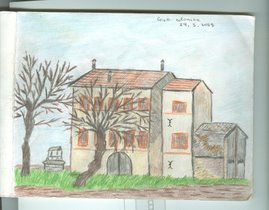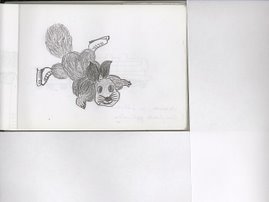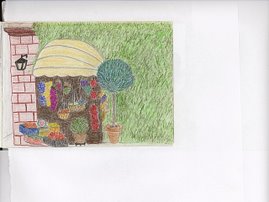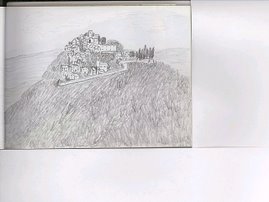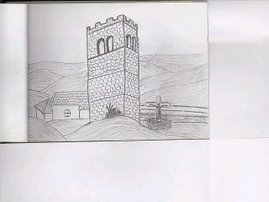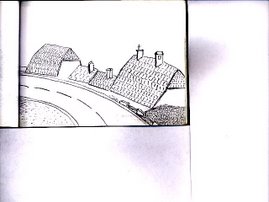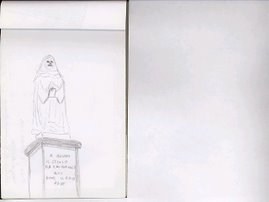Andrea Vianello, Assurdo Italia, Baldini Castoldi, 2008
The book quoted above deals with some absurd situations which seem to be typically Italian.
I'd like to translate a passage referring to some methods used in Naples to avoid paying fines and penalties. See the original text below.
(pages 77-79)
Furelli [the protagonist of the story] stated that in Naples there were (maybe still there are) many ways not to pay fines.
The first method is that of the dead man: after someone dies, the local camorra boss buys some cars in his name. When those cars get fines, the fines are sent to the dead man's house, but, as we know, dead people cannot pay ...
Another method is that of the 'good' postman: the postman takes a fine to a certain person. The person opens the letter and sees that the amount is too high. The 'good' postman is available to state that the letter was sent to an 'unknown receiver' and the fine is sent back. If a fine is not paid within a certain time for an acceptable reason it is no longer mandatory to pay it. Furelli said that, at that time, 27% of the fines were sent back like this, with good or bad reasons.
Another method was that of the white document. The original fine was copied on a white document: faithfully, except for one or two zeros, which were canceled from the correct amount to be paid. So, if you had to pay 100,000 Lire, the fine could be reduced to 10,000.
In this way local authorities lost most of the sums.
Another method was that of the cheating lawyer. A lawyer or pseudo-lawyer was sent to a public office. He asked to see a document kept in rooms full of papers, and while he was alone in the office he put the fine somewhere out of order so that it would never be found again.
Another method is that of the flood: strangely enough, Furelli said, the store for fines in Naples was moved to an old school in ruin and full of water: the original documents were damaged by water and other liquids used for the building; then they were given to the Red Cross like useless papers.
If the original documents get lost, authorities cannot oblige people to pay the fines.
When Furelli was working in the Town Hall in Naples, in 1994, he could witness the first consequences of the Italian phenomenon 'crazy fines'. By means of computers, fines were recorded in succession up to number 99,000. When fines were hundreds of thousands the succession was interrupted and the list began again with the first numbers 1, 2 ... In this way the previous fines disappeared and were replaced by the new ones.
For local authorities in Naples getting the money for fines and penalties seem to be more difficult than winning the lottery.
____________________________________________________________
Original text:
(pp. 77-79)
Sostiene Furelli infatti che per non pagare una multa a Napoli esistevano (oppure esistono?) molti metodi.
C'era il metodo del morto: un tizio tira le cuoia, il camorrista della zona mette le mani sul suo certificato di residenza e si intestano al deceduto un certo numero di automobili. Così, quando queste compiono un'infrazione, la multa arriva al morto, e si sa che i morti non possono pagare ...
C'era il metodo del portalettere 'buono': arrivato a casa del contravventore, i due controllavano insieme la cifra richiesta e, se era troppo alta, si richiudeva il tutto e si rimandava al mittente con la dicitura 'destinatario sconosciuto', così passavano i tempi previsti per legge e si sperava nella prescrizione. Sostiene Furelli che, all'epoca, il 27% delle multe tornavano indietro, a torto o a ragione.
Poi c'era il metodo del bollettino bianco: con la complitcità di qualche amico nell'ufficio giusto, si trascriveva il verbale su un modulo vergine e si toglieva uno zero. Centomila lire diventavano diecimila, il verbale risultava pagato ma il comune perdeva novantamila lire ..
Poi ancora il metodo dell'avvocaticchio: un legale o un presunto tale andava a chiedere di controllare un verbale, entrava in un archivio più simile a un magazzino impolverato che a un ufficio pubblico efficiente, e in un attimo di distrazione degli addetti, zac! rimetteva il verbale nel posto sbagliato, in pratica facendolo perdere per sempre.
Oppure quello più sistematico, il metodo allagamento: chissà come mai, sostiene Furelli, il centro deposito delle multe di Napoli venne un giorno spostato in una vecchia scuola diroccata, dove periodiche perdite di acqua finirono per danneggiare migliaia e migliaia di multe originali. E quando le rimanenti vennero trasferite in un locale dismesso della prefettura, i lavori di disinfestazione furono compiuti inavvertitamente con l'uso di liquidi corrosivi che distrussero altrettanti verbali, poi consegnati alla Croce Rossa come materiale fuori uso ...
E attenzione, la scomparsa del verbale originario è decisiva in caso di ricorso: il giudice di pace può pronunciarsi a favore del Comune solo se viene esibita la prima contravvenzione. Se questa non c'è, multa annullata, e soldi perduti!
Durante la sua gestione, inoltre, Furelli visse indirettamente nel 1994 anche il primo fenomeno di 'multa pazza' italiana. che fu dovuto proprio all'informatica, anche se non quella gestita da lui: il sistema computerizzato della concessionaria esattoriale era troppo antiquato e aveva un 'baco'. Dopo il numero 99.000 ripartiva da zero: così quando vennero iscritti a ruolo centinaia di migliaia di verbali non pagati, abbinando in ordine progressivo il numero di verbale al rispettivo contribuente, arrivati a centomila si ricominciò inavvertitamente da capo, e i primi della lista si ritrovarono appioppati verbali non loro, e giù per li rami. Grande scandalo, grandi proteste, e tantissime altre multe annullate.
Insomma, incassare una multa a Napoli era per il Comune proprio come vincere un terno al lotto.
Sunday, February 8, 2009
Wednesday, September 17, 2008
Gentilini's speech in Venice
The article copied below is taken from 'La Tribuna di Treviso' of September 17, 2008 and deals with Gentilini's speech at the Lega Nord Meeting in Venice on September 14, 2008.
Gentilini is the Vice-Mayor of Treviso.
His speech is written in the square 'Così parlò il vicesindaco'.
I translated it because it is worth letting foreigners know how racist a part of our political leadership is.

"People of the Lega Nord! The Lega woke up. Rome's walls are falling down, attacked by the Lega's weapons. My word is revolution. This is Gentilini's Gospel, the Decalogue of the first Sheriff-Mayor. I want a revolution against aliens, I want a revolution against nomads' and gypsies' camps. I destroyed two of them in Treviso. And now none is left, not even One. I want to get rid of the children who rob our old people. If Maroni [a minister of Berlusconi's government] says 'No tolerance', I want a double 'No tolerance'. I want a revolution against the TV and the newspapers criticizing the Lega. I will buy some plugs to shut their mouths and stuff their a... I want to see them no longer. I want a revolution against prostitutes. They must pay their taxes, too. Everybody pays taxes; they must pay, too. I want a revolution against those who want to open Islamic centers and mosques, including the church hierarchies who want to let them pray. No! They must go and pray in the deserts. I will open a factory of carpets and give them carpets, but they must go and pray in the deserts. Enough! I wrote to the Pope, too: Muslims must go back to their countries. I want a revolution against the courts of justice. Laws must be applied by Veneto judges. I want a revolution against those who want to give our old people's money to their foreign assistants. It is our money and I want it for myself. This is Gentilini's Gospel: all for us and only what is left for others. But nothing will be left. I want a revolution against the phone centers where people eat at night and piss on the walls. Let them piss in their mosques! I want a revolution against women's burqas and veils. I want to see a woman in her face, because behind the veil there may be a terrorist keeping a gun between his legs. Why don't they show their umbilicus instead? I wrote the President of the Republic that they should reward the usher who stopped the Muslim woman at the door of Ca' Rezzonico museum.
I want a revolution against those who say that we must eat Naples' rubbish. I will get it and grind it and then give it back to them because they produced it. I can't bear it. I want a revolution against those who want to give the foreigners the right to vote. I do not want to see black, brown, grey people teaching our children. What could they teach? The desert's civilization? Voting is just for us. I need the Lega's people. These are the words of Gentilini's Gospel. I need you. Keep close. I do not want to see these people walking around all day and night. I hug you. Up with Lega!"
Gentilini is the Vice-Mayor of Treviso.
His speech is written in the square 'Così parlò il vicesindaco'.
I translated it because it is worth letting foreigners know how racist a part of our political leadership is.

"People of the Lega Nord! The Lega woke up. Rome's walls are falling down, attacked by the Lega's weapons. My word is revolution. This is Gentilini's Gospel, the Decalogue of the first Sheriff-Mayor. I want a revolution against aliens, I want a revolution against nomads' and gypsies' camps. I destroyed two of them in Treviso. And now none is left, not even One. I want to get rid of the children who rob our old people. If Maroni [a minister of Berlusconi's government] says 'No tolerance', I want a double 'No tolerance'. I want a revolution against the TV and the newspapers criticizing the Lega. I will buy some plugs to shut their mouths and stuff their a... I want to see them no longer. I want a revolution against prostitutes. They must pay their taxes, too. Everybody pays taxes; they must pay, too. I want a revolution against those who want to open Islamic centers and mosques, including the church hierarchies who want to let them pray. No! They must go and pray in the deserts. I will open a factory of carpets and give them carpets, but they must go and pray in the deserts. Enough! I wrote to the Pope, too: Muslims must go back to their countries. I want a revolution against the courts of justice. Laws must be applied by Veneto judges. I want a revolution against those who want to give our old people's money to their foreign assistants. It is our money and I want it for myself. This is Gentilini's Gospel: all for us and only what is left for others. But nothing will be left. I want a revolution against the phone centers where people eat at night and piss on the walls. Let them piss in their mosques! I want a revolution against women's burqas and veils. I want to see a woman in her face, because behind the veil there may be a terrorist keeping a gun between his legs. Why don't they show their umbilicus instead? I wrote the President of the Republic that they should reward the usher who stopped the Muslim woman at the door of Ca' Rezzonico museum.
I want a revolution against those who say that we must eat Naples' rubbish. I will get it and grind it and then give it back to them because they produced it. I can't bear it. I want a revolution against those who want to give the foreigners the right to vote. I do not want to see black, brown, grey people teaching our children. What could they teach? The desert's civilization? Voting is just for us. I need the Lega's people. These are the words of Gentilini's Gospel. I need you. Keep close. I do not want to see these people walking around all day and night. I hug you. Up with Lega!"
Tuesday, September 16, 2008
Gentilini and racism in Italy
I am glad that the European Union looks at Italy as a country where racism may endanger the local population.
Racism is a frequent social problem in several societies but laws and political leaders should represent civilization and make it clear that racism is unacceptable nowadays.
The problem in Italy is that some politicians of the local government even boast of being racist.
I'd like to translate into English one of my recent posts, where I reported what Mr Gentilini said. Gentilini is a member of the Lega Nord party, which is one of the political parties belonging to the present government of Mr Berlusconi.
All the sentences are literally reported from one of the main Italian national newspapers, Corriere della Sera, on September 10, 2008.
Gentilini: "Spazi agli ebrei, mai ai musulmani".
"A Treviso ci sono i Testimoni di Geova e i Battisti, e con loro non c'è alcun problema. Se venisse la comunità ebraica a chiedermi uno spazio, glielo darei subito. Ma a quella islamica mai! Non c'è alcun margine di trattativa con una confessione che esorta i seguaci all'eliminazione dell'infedele."
([my translation] Buildings and places for Jews, never for Muslims. In Treviso there are some religious groups like Jehowah's Witnesses and Baptists. There are no problems with them. If the Jewish community wants a room, I would give them immediately. But never to Muslims! It is impossible to come to terms with a religion which wants the destruction of the infidels)
"Musulmani buoni? Sono tutti seguaci dell'Islam e la religione islamica invita non alla conversione degli avversari ma alla loro eliminazione: sono degli infedeli. Dunque finchè alla base della loro religione ci saranno questi presupposti, non credo vi possa essere alcun margine per una trattativa nella cattolicissima Treviso"
(Are Muslims good? They are all followers of Islam and the islamic religion does not want the conversion of their opponents but their deaths: they are all infidels. As far as their religion is based on such principles, our very catholic Treviso can have nothing to do with them)
"C'è una grande differenza tra l'Islam e la religione cattolica. I nostri ministri seguono una gerarchia che comincia dal popolo; loro hanno gli imam, fanno quello che gli dicono e quando qualcuno li rimprovera alzano le braccia: 'Non possiamo opporci'."
(There is a strong difference between Islam and the catholic religion. Our priests follow a hierarchy rising from the people; they are represented by imams and people must obey them. When someone reproaches them, they just raise their arms and say: 'We cannot refuse this')
"Io non mi sono mai sognato di costruire muri ma c'è un muro ideale a Treviso nei confronti di quanti vogliono occupare abusivamente il nostro territorio."
(I have never built a wall, but there is an ideal wall in Treviso against those who want to occupy our territory illegally)
"Se venisse da me la comunità ebraica, uno spazio glielo darei subito. Qui a Treviso ci sono anche i Testimoni di Geova e i Battisti, diverse sfumature ma alla base c'è sempre il Vangelo di Cristo. E non vanno confuse con l'Islam"
(If the Jewish Community comes and asks me for a room, I would soon give it to them. Here in Treviso Jehowah's Witnesses and Baptists live: both groups are based on Christ's Gospel. Nothing to do with Islam)
I want to add that in the recent meeting of Lega Nord in Venice Gentilini got more and more vulgar and openly racist and he even threatened journalists not to dare to criticize him.
If people listen to such vulgar and disrespectful sentences, they may think that it is nonsense not worth being considered.
The serious problem is that that man is a powerful politician and the vice-mayor of one important Italian towns, and Berlusconi government gave special superpowers to mayors and vice-mayors.
If the Italian government cannot realize how low we have fallen, I hope the European leadership can keep an eye on such potentially dangerous situations.
Racism is a frequent social problem in several societies but laws and political leaders should represent civilization and make it clear that racism is unacceptable nowadays.
The problem in Italy is that some politicians of the local government even boast of being racist.
I'd like to translate into English one of my recent posts, where I reported what Mr Gentilini said. Gentilini is a member of the Lega Nord party, which is one of the political parties belonging to the present government of Mr Berlusconi.
All the sentences are literally reported from one of the main Italian national newspapers, Corriere della Sera, on September 10, 2008.
Gentilini: "Spazi agli ebrei, mai ai musulmani".
"A Treviso ci sono i Testimoni di Geova e i Battisti, e con loro non c'è alcun problema. Se venisse la comunità ebraica a chiedermi uno spazio, glielo darei subito. Ma a quella islamica mai! Non c'è alcun margine di trattativa con una confessione che esorta i seguaci all'eliminazione dell'infedele."
([my translation] Buildings and places for Jews, never for Muslims. In Treviso there are some religious groups like Jehowah's Witnesses and Baptists. There are no problems with them. If the Jewish community wants a room, I would give them immediately. But never to Muslims! It is impossible to come to terms with a religion which wants the destruction of the infidels)
"Musulmani buoni? Sono tutti seguaci dell'Islam e la religione islamica invita non alla conversione degli avversari ma alla loro eliminazione: sono degli infedeli. Dunque finchè alla base della loro religione ci saranno questi presupposti, non credo vi possa essere alcun margine per una trattativa nella cattolicissima Treviso"
(Are Muslims good? They are all followers of Islam and the islamic religion does not want the conversion of their opponents but their deaths: they are all infidels. As far as their religion is based on such principles, our very catholic Treviso can have nothing to do with them)
"C'è una grande differenza tra l'Islam e la religione cattolica. I nostri ministri seguono una gerarchia che comincia dal popolo; loro hanno gli imam, fanno quello che gli dicono e quando qualcuno li rimprovera alzano le braccia: 'Non possiamo opporci'."
(There is a strong difference between Islam and the catholic religion. Our priests follow a hierarchy rising from the people; they are represented by imams and people must obey them. When someone reproaches them, they just raise their arms and say: 'We cannot refuse this')
"Io non mi sono mai sognato di costruire muri ma c'è un muro ideale a Treviso nei confronti di quanti vogliono occupare abusivamente il nostro territorio."
(I have never built a wall, but there is an ideal wall in Treviso against those who want to occupy our territory illegally)
"Se venisse da me la comunità ebraica, uno spazio glielo darei subito. Qui a Treviso ci sono anche i Testimoni di Geova e i Battisti, diverse sfumature ma alla base c'è sempre il Vangelo di Cristo. E non vanno confuse con l'Islam"
(If the Jewish Community comes and asks me for a room, I would soon give it to them. Here in Treviso Jehowah's Witnesses and Baptists live: both groups are based on Christ's Gospel. Nothing to do with Islam)
I want to add that in the recent meeting of Lega Nord in Venice Gentilini got more and more vulgar and openly racist and he even threatened journalists not to dare to criticize him.
If people listen to such vulgar and disrespectful sentences, they may think that it is nonsense not worth being considered.
The serious problem is that that man is a powerful politician and the vice-mayor of one important Italian towns, and Berlusconi government gave special superpowers to mayors and vice-mayors.
If the Italian government cannot realize how low we have fallen, I hope the European leadership can keep an eye on such potentially dangerous situations.
Saturday, September 6, 2008
"La Padania"
"La Padania" is a daily newspaper published in the north of Italy. It represents the political party Lega Nord. What surprises is that nothing is written about foreign countries. This is strange enough in Italy, because even local newspapers ("Il Gazzettino" in Venice, "Il Resto del Carlino" in Bologna, "L'Arena di Verona") deal with foreign news.
Narrow-mindedness? Not by chance the Leghisti are openly hostile to the foreigners living in Italy.
Narrow-mindedness? Not by chance the Leghisti are openly hostile to the foreigners living in Italy.
Friday, September 5, 2008
Welcome back to my English blog!
I will write again in my English blog.
I began it when I was in USA in 2007. Now I am in Italy and I usually write in my Italian blog
www.rbarazza.blogspot.com
but some recent events make it necessary to let a wider public (who may just by chance fall into my blog) know what is happening around me.
Just to begin: the contrast in Treviso between the vice-mayor Gentilini and the local Muslim minority.
It is Ramadan time and the Muslim inhabitants want to pray but they are not allowed, not by the Italian Constitution, which guarantees (in theory at least) to everybody the right to practise their religion, but by the local mayors who have been recently given special powers.
Of course there are more and less intelligent mayors ...
What is happening in Treviso is that the local Muslim minority are deprived of their right to pray. If they want to pray they can do it individually (it's an idea! why don't we create individual church sevices for the Christian Christmases and Easters as well?) or out of Treviso territory.
I began it when I was in USA in 2007. Now I am in Italy and I usually write in my Italian blog
www.rbarazza.blogspot.com
but some recent events make it necessary to let a wider public (who may just by chance fall into my blog) know what is happening around me.
Just to begin: the contrast in Treviso between the vice-mayor Gentilini and the local Muslim minority.
It is Ramadan time and the Muslim inhabitants want to pray but they are not allowed, not by the Italian Constitution, which guarantees (in theory at least) to everybody the right to practise their religion, but by the local mayors who have been recently given special powers.
Of course there are more and less intelligent mayors ...
What is happening in Treviso is that the local Muslim minority are deprived of their right to pray. If they want to pray they can do it individually (it's an idea! why don't we create individual church sevices for the Christian Christmases and Easters as well?) or out of Treviso territory.
Sunday, May 27, 2007
Iraqi war
How can people support Iraqi war? What does Iraq have to do with 9/11? Almost nothing. No one of the people accused of 9/11 was from Iraq. Isn't this enough to say that Iraq war is absurd and should be stopped immediately?
Saturday, May 19, 2007
Disney
Disney could only have been born in America.
When I walk along the strees in Indiana, I have the impression of being in a Disney cartoon: anywhere jumping hares in the gardens, squirrels eating their nuts, big colourful butterflies coming shopping with me, and red, blue, green birds singing around ...
When I walk along the strees in Indiana, I have the impression of being in a Disney cartoon: anywhere jumping hares in the gardens, squirrels eating their nuts, big colourful butterflies coming shopping with me, and red, blue, green birds singing around ...
Subscribe to:
Posts (Atom)
